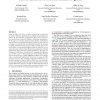Free Online Productivity Tools
i2Speak
i2Symbol
i2OCR
iTex2Img
iWeb2Print
iWeb2Shot
i2Type
iPdf2Split
iPdf2Merge
i2Bopomofo
i2Arabic
i2Style
i2Image
i2PDF
iLatex2Rtf
Sci2ools
PPOPP
2015
ACM
2015
ACM
Barrier elision for production parallel programs
Large scientific code bases are often composed of several layers of runtime libraries, implemented in multiple programming languages. In such situation, programmers often choose conservative synchronization patterns leading to suboptimal performance. In this paper, we present context-sensitive dynamic optimizations that elide barriers redundant during the program execution. In our technique, we perform data race detection alongside the program to identify redundant barriers in their calling contexts; after an initial learning, we start eliding all future instances of barriers occurring in the same calling context. We present an automatic on-the-fly optimization and a multi-pass guided optimization. We apply our techniques to NWChem—a 6 million line computational chemistry code written in C/C++/Fortran that uses several runtime libraries such as Global Arrays, ComEx, DMAPP, and MPI. Our technique elides a surprisingly high fraction of barriers (as many as 63%) in production runs. T...
| Added | 16 Apr 2016 |
| Updated | 16 Apr 2016 |
| Type | Journal |
| Year | 2015 |
| Where | PPOPP |
| Authors | Milind Chabbi, Wim Lavrijsen, Wibe de Jong, Koushik Sen, John M. Mellor-Crummey, Costin Iancu |
Comments (0)

